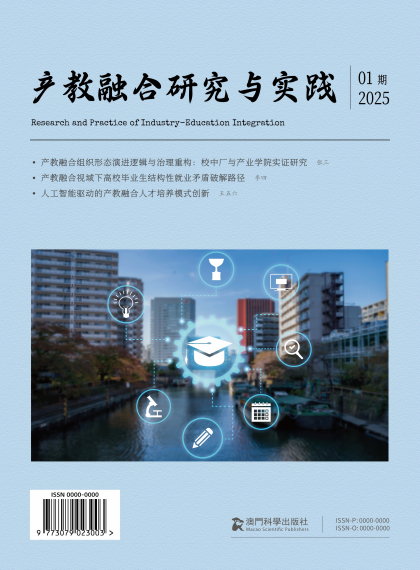摘 要:
在当前社会环境的背景下,高职院校以产教融合作为培养人才的重要途径,并逐渐深入到人才培养的各个环节,但其主体关系的探讨仍然处于初级阶段。在复杂适应理论视阈下,本论文对产教融合中学校、企业、学生三者的合作关系进行研究,旨在通过改造和创新关系主体以达成更优的人才培养结果。在研究过程中,通过复杂适应理论的角度,对高职院校、企业与学生之间的互动关系进行深度剖析,并依此提出一种适应于高职院校的主体关系重塑。研究认为,产教融合是多元主体的互动过程,高职院校、企业和学生三者应制定互利共赢的合作模式,凝聚共同利益,促进个体与整体的和谐发展。进一步的,通过主体关系重塑,学校的教育资源利用可以优化,企业可以得到更好的人才桥梁,学生的职业素质和技能将得到提升,从而更好地满足社会发展的需求。这种主体关系重塑不仅可以提高高职教育质量,也有力推动了产教融合模式的创新与发展。
关键词:产教融合;高职院校;主体关系重塑;人才培养
Abstract:
In the current social environment, higher vocational colleges take the integration of industry and education as an important way to cultivate talents, gradually deepening into various aspects of talent training. However, the exploration of its subject relationships is still in the preliminary stage. This paper studies the cooperative relationship among schools, enterprises, and students in the integration of industry and education from the perspective of complex adaptive theory, aiming to achieve better talent training outcomes through the transformation and innovation of the relationship subjects. In the research process, a deep analysis is conducted on the interactive relationships among higher vocational colleges, enterprises, and students through the lens of complex adaptive theory. Based on this, a restructuring of the subject relationships suitable for higher vocational colleges is proposed. The study suggests that the integration of industry and education is an interactive process among multiple subjects. Higher vocational colleges, enterprises, and students should establish a mutually beneficial and win-win cooperation model, consolidate common interests, and promote the harmonious development of individuals and the whole. Furthermore, through the restructuring of subject relationships, the utilization of educational resources in schools can be optimized, enterprises can gain a better talent bridge, and students' professional qualities and skills will be enhanced, thus better meeting the needs of social development. This restructuring of subject relationships not only improves the quality of higher vocational education but also strongly promotes the innovation and development of the integration of industry and education models.
Keywords: Integration of industry and education; Higher vocational colleges; Restructuring of subject relationships; Talent cultivation
--
